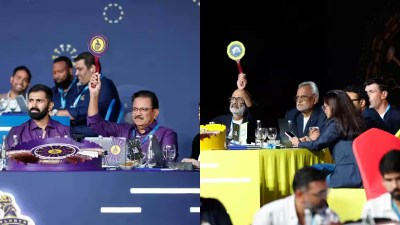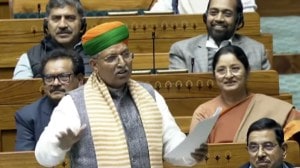First launched by DU, NCTE now proposes to discontinue 4-year B.El.Ed programme by 2026
The proposal is part of the draft NCTE (Recognition Norms and Procedure) Regulations, 2025, which were made public for feedback recently.
 The draft NCTE (Recognition Norms and Procedure) Regulations, 2025, which were made public for feedback recently, said that the B.El.Ed programme shall be discontinued from the 2026-27 academic session onwards (Representational image)
The draft NCTE (Recognition Norms and Procedure) Regulations, 2025, which were made public for feedback recently, said that the B.El.Ed programme shall be discontinued from the 2026-27 academic session onwards (Representational image)Three decades after it was first launched by Delhi University, the National Council for Teacher Education (NCTE) has proposed to discontinue the B.El.Ed (Bachelor of Elementary Education) programme, a four-year degree programme in elementary teacher education.
The draft NCTE (Recognition Norms and Procedure) Regulations, 2025, which were made public for feedback recently, said that the B.El.Ed programme shall be discontinued from the 2026-27 academic session onwards, and no fresh admissions shall be allowed to any of the existing institutions conducting the four-year B.El.Ed programme.
Institutions which have been granted recognition for the B.El.Ed programme “shall continue and they shall be allowed to enroll students subject to the condition that they shall transit to the new Integrated Teacher Education Programme (ITEP)” before the start of the 2026-27 academic session, the draft regulations said.
The last time that the NCTE issued regulations that specified the norms and standards for teacher education programmes was in 2014. The 2014 regulations said that B.El.Ed, offered as a professional degree programme after class 12, prepared teachers for the elementary stage of education, which is classes I to VIII. While Delhi University launched it in the 1994-95 academic year, the NCTE first notified regulations for the B.El.Ed programme in 1999.
“This year, we will allow admissions to the B.El.Ed programme, but from 2026 onwards, admissions will not be allowed. We have proposed that this programme should transit into ITEP. We are bringing new programmes in light of the National Education Policy (NEP) 2020, so the old programmes will get merged into the new ones,” NCTE Chairman Pankaj Arora said.
ITEP, a four-year programme (BA B.Ed/ B.Sc B.Ed/ B.Com B.Ed) after class 12, which was launched in pilot mode in a few institutions from the 2023-24 academic session onwards, will no longer be on pilot mode and will be offered as a regular programme for teacher education from the 2025-26 session onwards, and will have four specialisations – Yoga, Physical Education, Sanskrit Education, and Art Education.
In 2023, the Delhi University Academic Council approved a resolution to replace B.El.Ed with ITEP.
Arora said that around 90-95 institutions across the country offer B.El.Ed.
The draft regulations also provide for one-year B.Ed and M.Ed programmes.
While the National Testing Agency (NTA) conducts the National Common Entrance Test (NCET) for ITEP, the draft regulations specify that admissions to the B.Ed and M.Ed programmes will also be through a “subject and aptitude test conducted by the NTA”. The regulations add that “a single nationwide entrance test will be conducted by NTA” for these courses.
Admissions to B.Ed and M.Ed courses in central universities are currently via the CUET-UG and CUET-PG, conducted by the NTA.
Arora said that the modalities of the test for B.Ed and M.Ed – whether it will be in line with the CUET or separate tests altogether – are yet to be worked out. “It will be a nationwide test through the NTA. At the moment, we have not decided on the entrance procedure. It is under consideration and the modalities will be worked out soon. Admissions under these regulations will take place in 2026,” he said.
ITEP is a key feature of the draft regulations. If a higher education institution wants to offer a B.Ed course, it must either already offer ITEP or must run ITEP by 2030.
NEP 2020 states: “By 2030, the minimum degree qualification for teaching will be a 4-year integrated B.Ed degree that teaches a range of knowledge content and pedagogy and includes strong practicum training in the form of student-teaching at local schools.”
“The policy mandate is that ITEP will be the premier programme of teacher education by 2030. So, only if the institution is offering ITEP, it can offer other programmes of teacher education,” Arora added.
Poonam Batra, professor of education, previously with Delhi University, who helped develop and co-ordinate the B.El.Ed programme for over two decades, said, “Closing down the B.El.Ed, will be a major disservice to the sector of teacher education in the country. B.El.Ed is the only integrated programme that prepares teachers via robust interdisciplinarity study, equipping them to innovate in classes on the basis of new frontiers of knowledge in school subjects and students’ diverse contexts and queries. It is a content and pedagogy rich programme, focuses on the teachers’ personal and professional development and integrates theory and practice via 70 percent practicum across all four years. Many of its features have shaped the two-year BEd.”
“Curriculum design has always been the prerogative of the university. With ITEP, this autonomy of the university is taken away, threatening the preparation of teachers to become homogenized. How then are teachers expected to teach in diverse classrooms – a reality in India? The ITEP claims to be integrated. It is in effect a 3+1 model…three years of graduation and one year of education within a colonial frame. This was what the B.El.Ed changed successfully. Why close it then?” she added.
- 01
- 02
- 03
- 04
- 05































